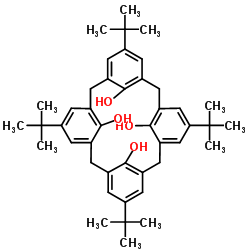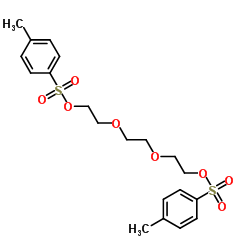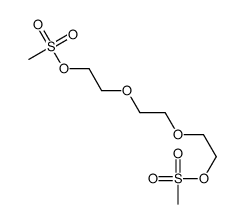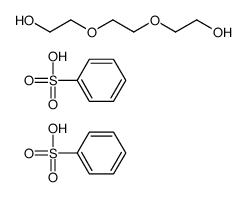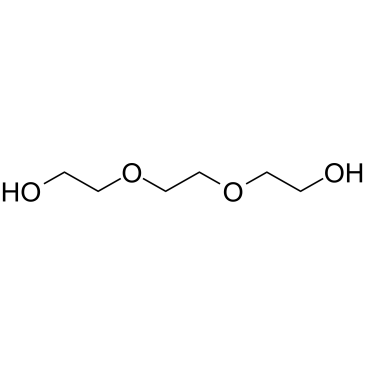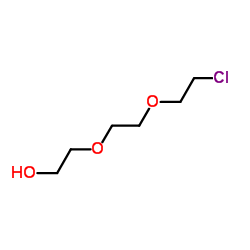171058-95-0
| Name | 4-tert-butyl-calix[4]arene-crown-4-complex |
|---|---|
| Synonyms |
4-TERT-BUTYLCALIX(4)-CROWN-4
5,11,17,23-Tetrakis(1,1-dimethyl)-25,26-dihydroxy-27,28-crown-4-calix[4]arene 25,27-(3,6-dioxaocta-1,8-diyl)oxy-26,28-dihydroxy-5,11,17,23-tetra-tert-butyl-calix[4]arene 5,11,17,23-Tetrakis(1,1-dimethylethyl)-25,27-(crown-4)-26,28-dihydroxycalix[4]arene p-t-butylcalix[4]crown-4 MFCD02093902 p-tert-butylcalix[4]crown-4 |
| Density | 1.069g/cm3 |
|---|---|
| Boiling Point | 766.4ºC at 760 mmHg |
| Molecular Formula | C40H48O4 |
| Molecular Weight | 592.80700 |
| Flash Point | 417.3ºC |
| Exact Mass | 592.35500 |
| PSA | 36.92000 |
| LogP | 7.72710 |
| Vapour Pressure | 2.48E-24mmHg at 25°C |
| Index of Refraction | 1.548 |
Synonym:None Known Section 2 - COMPOSITION, INFORMATION ON INGREDIENTS
Risk Phrases: 36/37/38 Section 3 - HAZARDS IDENTIFICATION EMERGENCY OVERVIEW
Irritating to eyes, respiratory system and skin. Potential Health Effects Eye: Causes eye irritation. May cause chemical conjunctivitis. Skin: Causes skin irritation. Ingestion: May cause gastrointestinal irritation with nausea, vomiting and diarrhea. Inhalation: Causes respiratory tract irritation. Can produce delayed pulmonary edema. Chronic: Effects may be delayed. Section 4 - FIRST AID MEASURES Eyes: Immediately flush eyes with plenty of water for at least 15 minutes, occasionally lifting the upper and lower eyelids. Get medical aid. Skin: Get medical aid. Flush skin with plenty of water for at least 15 minutes while removing contaminated clothing and shoes. Wash clothing before reuse. Ingestion: Never give anything by mouth to an unconscious person. Get medical aid. Do NOT induce vomiting. If conscious and alert, rinse mouth and drink 2-4 cupfuls of milk or water. Inhalation: Remove from exposure and move to fresh air immediately. If not breathing, give artificial respiration. If breathing is difficult, give oxygen. Get medical aid. Do NOT use mouth-to-mouth resuscitation. Notes to Physician: Treat symptomatically and supportively. Section 5 - FIRE FIGHTING MEASURES General Information: As in any fire, wear a self-contained breathing apparatus in pressure-demand, MSHA/NIOSH (approved or equivalent), and full protective gear. During a fire, irritating and highly toxic gases may be generated by thermal decomposition or combustion. Runoff from fire control or dilution water may cause pollution. Extinguishing Media: In case of fire, use water, dry chemical, chemical foam, or alcohol-resistant foam. Use water spray, dry chemical, carbon dioxide, or appropriate foam. Section 6 - ACCIDENTAL RELEASE MEASURES General Information: Use proper personal protective equipment as indicated in Section 8. Spills/Leaks: Vacuum or sweep up material and place into a suitable disposal container. Clean up spills immediately, observing precautions in the Protective Equipment section. Avoid generating dusty conditions. Provide ventilation. Section 7 - HANDLING and STORAGE Handling: Minimize dust generation and accumulation. Avoid contact with eyes, skin, and clothing. Keep container tightly closed. Avoid ingestion and inhalation. Use with adequate ventilation. Wash clothing before reuse. Storage: Store in a tightly closed container. Store in a cool, dry, well-ventilated area away from incompatible substances. Section 8 - EXPOSURE CONTROLS, PERSONAL PROTECTION Engineering Controls: Facilities storing or utilizing this material should be equipped with an eyewash facility and a safety shower. Use adequate ventilation to keep airborne concentrations low. Exposure Limits CAS# 171058-95-0: Personal Protective Equipment Eyes: Wear appropriate protective eyeglasses or chemical safety goggles as described by OSHA's eye and face protection regulations in 29 CFR 1910.133 or European Standard EN166. Skin: Wear appropriate protective gloves to prevent skin exposure. Clothing: Wear appropriate protective clothing to prevent skin exposure. Respirators: A respiratory protection program that meets OSHA's 29 CFR 1910.134 and ANSI Z88.2 requirements or European Standard EN 149 must be followed whenever workplace conditions warrant respirator use. Section 9 - PHYSICAL AND CHEMICAL PROPERTIES Physical State: Crystalline powder Color: fine - white to almost white Odor: Not available. pH: Not available. Vapor Pressure: Not available. Viscosity: Not available. Boiling Point: Not available. Freezing/Melting Point: Not available. Autoignition Temperature: Not available. Flash Point: Not available. Explosion Limits, lower: Not available. Explosion Limits, upper: Not available. Decomposition Temperature: Solubility in water: Not available. Specific Gravity/Density: Molecular Formula: C50H66O6 Molecular Weight: 762.4584 Section 10 - STABILITY AND REACTIVITY Chemical Stability: Stable under normal temperatures and pressures. Conditions to Avoid: Incompatible materials, dust generation, excess heat, strong oxidants. Incompatibilities with Other Materials: Oxidizing agents. Hazardous Decomposition Products: Carbon monoxide, irritating and toxic fumes and gases, carbon dioxide. Hazardous Polymerization: Has not been reported Section 11 - TOXICOLOGICAL INFORMATION RTECS#: CAS# 171058-95-0 unlisted. LD50/LC50: Not available. Carcinogenicity: 4-Tert.-Butyl-Calix[4]arene-Crown-4-Complex - Not listed by ACGIH, IARC, or NTP. Section 12 - ECOLOGICAL INFORMATION Section 13 - DISPOSAL CONSIDERATIONS Dispose of in a manner consistent with federal, state, and local regulations. Section 14 - TRANSPORT INFORMATION IATA No information available. IMO No information available. RID/ADR No information available. Section 15 - REGULATORY INFORMATION European/International Regulations European Labeling in Accordance with EC Directives Hazard Symbols: XI Risk Phrases: R 36/37/38 Irritating to eyes, respiratory system and skin. Safety Phrases: WGK (Water Danger/Protection) CAS# 171058-95-0: No information available. Canada None of the chemicals in this product are listed on the DSL/NDSL list. CAS# 171058-95-0 is not listed on Canada's Ingredient Disclosure List. US FEDERAL TSCA CAS# 171058-95-0 is not listed on the TSCA inventory. It is for research and development use only. SECTION 16 - ADDITIONAL INFORMATION N/A |
| Hazard Codes | Xi |
|---|---|
| Risk Phrases | R36/37/38 |
| Safety Phrases | S26-S37-S39 |
|
~53% 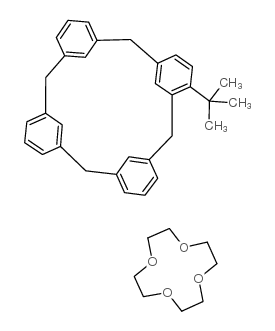
171058-95-0 |
| Literature: Chawla, Har Mohindra; Hundal, Geeta; Kumar; Singh, Parminder Journal of Inclusion Phenomena and Macrocyclic Chemistry, 2012 , vol. 72, # 3-4 p. 323 - 330 |
|
~56% 
171058-95-0 |
| Literature: Gruen, Alajos; Koszegi, Eva; Bitter, Istvan Tetrahedron, 2004 , vol. 60, # 23 p. 5041 - 5048 |
|
~68% 
171058-95-0 |
| Literature: Alekseeva, Elena A.; Basok, Stepan S.; Mazepa, Alexander V.; Gren, Andrei I. Mendeleev Communications, 2007 , vol. 17, # 6 p. 330 - 331 |
|
~71% 
171058-95-0 |
| Literature: Alekseeva, Elena A.; Basok, Stepan S.; Mazepa, Alexander V.; Gren, Andrei I. Mendeleev Communications, 2007 , vol. 17, # 6 p. 330 - 331 |
|
~% 
171058-95-0 |
| Literature: Csokai, Viktor; Gruen, Alajos; Bitter, Istvan Tetrahedron Letters, 2003 , vol. 44, # 25 p. 4681 - 4684 |
|
~% 
171058-95-0 |
| Literature: Gruen, Alajos; Koszegi, Eva; Bitter, Istvan Tetrahedron, 2004 , vol. 60, # 23 p. 5041 - 5048 |
|
~% 
171058-95-0 |
| Literature: Gruen, Alajos; Koszegi, Eva; Bitter, Istvan Tetrahedron, 2004 , vol. 60, # 23 p. 5041 - 5048 |
